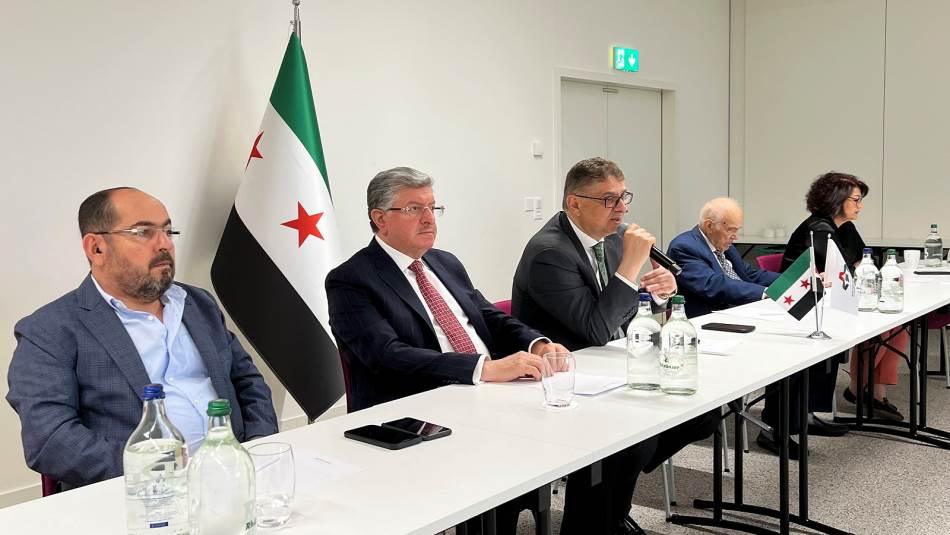The Syrian Opposition Negotiation Commission reiterated its “firm” commitment to Security Council Resolution 2254 in order to achieve a political resolution in Syria. It believes that the current international and regional conditions are conducive to the resumption of direct negotiations with the regime in accordance with Resolution 2254. Moreover, it strongly opposed the regime’s reinstatement in the Arab League, labelling such a return as “unjustified.”
The call for the resumption of direct negotiations should not be considered a significant violation, as the meetings of the Constitutional Committee had previously taken place directly between the opposition and regime delegations, under the supervision of the United Nations. However, these meetings have been on hold since June 2022.
The Commission recently concluded its meetings in Geneva, which commenced on Friday. It was a noteworthy occasion as all its components participated together for the first time since 2019. The objective was to bridge differences and unite the opposition in response to changes in the Syrian conflict and revitalize the political process.
HTS Starts Getting Rid of Foreign Fighters: Travel to Ukraine Or…
During these meetings, the Commission discussed various topics, including the evolving situation in Syria, regional and international events impacting the Syrian crisis, the Commission’s stances on these matters, and strategies to address them. Additionally, they focused on the plight of the Syrian people, particularly in the aftermath of the recent earthquake.
The Commission also deliberated on the Amman consultative meeting’s statement, which outlined the Arab initiative for a solution in Syria based on the “step for step” principle. It also took note of the meeting of Arab foreign ministers in Jeddah, which regrettably did not make reference to Resolution 2254, and the quadripartite meetings held in Moscow.
The Commission emphasized that the “strict and complete implementation of Resolution 2254” serves as the guarantee for achieving a genuine political transition, eradicating terrorism, facilitating the withdrawal of foreign militias, safeguarding Syrian territorial unity, and ensuring Arab and regional security. It expressed gratitude for any endeavours that contribute to a solution in line with the resolution, with the aim of transitioning towards a democratic Syria characterized by freedom and political pluralism and achieving a peaceful political transition.
The Commission cautioned that granting the regime prior confidence to rejoin the Arab League without adhering to international resolutions carries the risk of enabling the regime to exploit the benefits of normalization without making progress towards a political solution or taking steps to establish stability, alleviate the suffering of the Syrian people, or strengthen national security.
The Commission emphasized the urgency of collective efforts to ensure the safe and voluntary return of refugees and halt the suffering of displaced individuals. It expressed gratitude towards host countries for their understanding of the immense challenges they face and condemned any discriminatory practices against refugees. The Commission called for the protection of refugees’ security and well-being in accordance with human rights and refugee conventions, firmly rejecting refoulement.
It appealed to “friendly and brotherly” nations to support the United Nations’ endeavours in implementing Resolution 2254. It stressed that the current international and regional circumstances are conducive to the resumption of direct negotiations with the regime, extending beyond the meetings of the Constitutional Committee.
The statement highlighted the Commission’s discussions on the issue of detainees and forcibly disappeared persons. It regarded this matter as a crucial element in building trust for the implementation of Resolution 2254. The Commission stressed the utmost importance of keeping this issue separate from any politicization and called for the accountability of all those responsible for genocide and massacres to ensure justice and sustainable peace.
The Commission noted that the regime’s economic and security policies have heightened the need for humanitarian aid. It criticized countries for failing to fulfill their pledges to provide humanitarian assistance and for the unequal distribution of aid. Additionally, it expressed concerns about organizations being subjected to the regime’s influence, manipulation, and corruption, thereby diminishing their effectiveness.
Furthermore, the Commission declared its support for any civil initiatives that strengthen the independence, autonomy, and efficacy of civil society. It welcomed all efforts aimed at organizing society and enhancing its capacities.
This article was translated and edited by The Syrian Observer. The Syrian Observer has not verified the content of this story. Responsibility for the information and views set out in this article lies entirely with the author.


